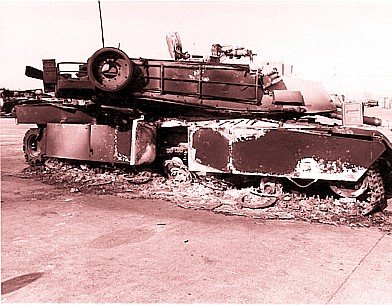Chairman Joint Chiefs: Iraq degrades capability but other wars still do-able

Remains of an M1 Abrams tank in Iraq
WASHINGTON — The U.S. military's top officer said Thursday that the Pentagon would have sufficient forces to win if called on to fight a war in North Korea, but the conflict would be more difficult without the intelligence and guidance systems devoted to Iraq and Afghanistan.
Marine Gen. Peter Pace, chairman of the Joint Chiefs of Staff, said that about 200,000 U.S. troops were deployed in Iraq and Afghanistan, leaving more than 2 million troops available for a war in Asia.
Pace said a conflict with North Korea, which both he and President Bush have said is highly unlikely, would rely heavily on the Navy and Air Force because of the significant deployment of land forces in Iraq. In addition, such an attack would not be "as clean as we would like," he said, because guidance systems used to aim bombs were in use in the Middle East.
"You wouldn't have the precision in combat going to a second theater of war that you would if you were only going to the first theater of war," Pace told a group of military reporters. "You end up dropping more bombs potentially to get the job done, and it would mean more brute force."
Although Pace did not name specific guidance and intelligence systems, Air Force officers have said they do not have surveillance aircraft such as Global Hawk and Predator reconnaissance drones available for East Asia because of their heavy use in Iraq and Afghanistan. The unmanned aircraft are used to spy on enemy territory.
Pace said a war in Asia would further strain U.S. troop rotations.
Pentagon officials have acknowledged in recent weeks that the Army is struggling to maintain a rotation that allows troops to return home for a year before redeploying to Iraq and Afghanistan. A third major conflict, Pace said, would probably end such yearlong respites.
One senior Pentagon official said if there were another war, most troops currently in Iraq would be forced into extended deployments, while those preparing to be sent to the Middle East would go to Asia.
Read the rest at the LA Times

<< Home